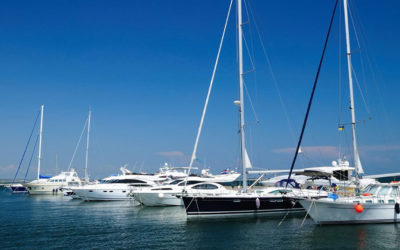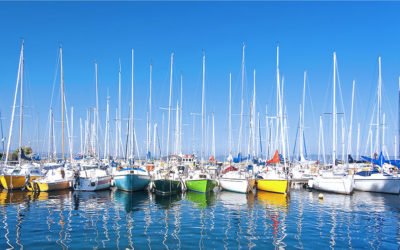Choosing the hull material of your boat is an important decision. Before picking aluminium or polyester, you need to consider the pros and cons of each material.
1. The advantages of an aluminum hull
Its major advantage is that it is lightweight compared to steel, but with almost identical strength and stiffness at the same thickness. Aluminium hulls are solid: these hulls are used for yachts that go on long voyages, particularly in the Polar Oceans.
It is a non-ferrous metal, so it doesn’t rust. Only its surface finish can tarnish because of the thin layer of grey alumina that protects it from corrosion.
Among the famous shipyards for their aluminium boats, we can mention Alubat and its Ovni or Meta yachts.
2. The disadvantages of an aluminum hull and recommendations
Aluminium is a highly conductive material. It is vulnerable to electrolysis (galvanic and electrolytic corrosion) in the form of pitting. The hull must be well insulated.
For boats intended to remain in the water long-term, some essential precautions must be taken:
- The bottom of the hull must be protected by an appropriate system, with the application of a special etch primer for aluminium hulls followed by a coat of compatible antifouling product. These paints can be purchased from specialist chandlers.
- A sufficient number of sacrificial anodes must be placed under the hull (eight for a 10-m long hull); made of zinc for sea water, magnesium for fresh water, or aluminium if the boat is used in rivers and seas.
The navigation equipment and electrical circuits must be perfectly insulated. In addition, all metallic components (motor, pumps, valves, etc.) must be connected to the earth of the quayside current.
Band of Boats advice: To be prepared whilst avoiding being connected to earth on a catway, a galvanic insulator should be installed. Remember to connect an earthing braid between the negative terminal of the battery and the aluminium hull.
Much progress has been made by the boatyards that build aluminium hulls, especially in the field of argon welding techniques. The “Strongall” technique allows simplified structures that are very solid and stiff and very impact-resistant.
Qualified welders are hard to find when repairs are required. (They must be certified.)
With regard to prices, aluminium costs around 20% more than polyester.
3. The advantages of a polyester hull
Composite materials have a matrix made of resin, which is often polyester, and glass fibre reinforcement material. When covered in a gel coat which constitutes their skin, they are easy to maintain, robust, and lightweight.
Polyester boat hulls have been very successful since the 1960s and have gained ground against wooden and metal hulls. This material has enabled shipyards to build many production boats. You will therefore find many second-hand boat models with a polyester hull. Among the most popular sailing boats with a polyester hull we can mention the Beneteau Océanis 45, the Jeanneau Sun Odyssey 36 I or the Bavaria 46 Cruiser.
4. The disadvantages of a polyester hull
Their durability is mediocre because of chemical degradation of the resins. This occurs by osmosis. Water ends up passing through the gel coat. It damages the resin, whose chemical compounds release an acidic substance. This acid exerts pressure under the gel coat and causes blistering. The glass fibre then absorbs moisture like a sponge. The material becomes soaked with water, so it softens, weakens, and rots.
What to do about osmosis ?
Osmosis should be treated promptly. The gel coat must be stripped off the hull. Specialist boatyards mainly use Hydrogomming or planing techniques.
The process takes around six months, to allow the hull to expel the acid.
A treatment to prevent osmosis, using special products, can be applied when purchasing a new boat or an old hull.
Band of Boats advises you to choose a hull according to the zone where you plan to sail.
Aluminium will withstand journeys in icy waters or collisions with unidentified floating objects better than polyester. Nevertheless, your budget and ease of maintenance and repair will be decisive factors in living your dream: building or buying your ideal boat.

